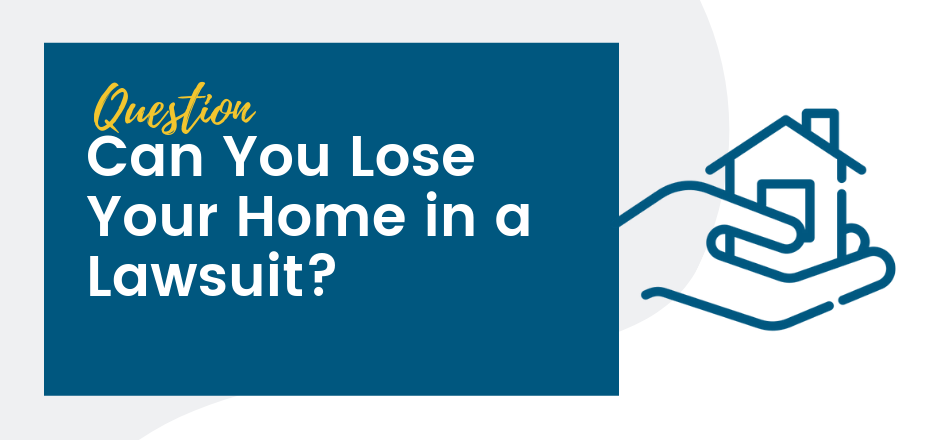Can You Lose Your Home in a Lawsuit in California?
If the court requires you to pay a large sum of money in light of a lawsuit and you aren’t able to afford it, you may be wondering if you can lose your home. This can be a scary thought, so we thought we could provide some information.
In this article, we’re taking a closer look at one of the most common questions we hear from people experiencing a lawsuit – Can you lose your home in a lawsuit in California?

Can You Lose Your Home in a Lawsuit in California?
Despite your best intentions, you’ve managed to find yourself on the losing end of a lawsuit. Your lawyer tells you that you aren’t likely to win and that you should prepare to have some of your assets seized.
The problem is you don’t have any assets – except for your house. Or, maybe the value of the lawsuit is so high, your assets could never even begin to hope to cover it entirely. Could the courts seize your home in an effort to pay back the plaintiff?
While it is possible for the courts to seize your home, California’s homestead laws and your circumstances could afford you protection. We’ll tell you what it all means, and what you need to know to fight for your rights, in this post.
Here’s a closer look at the risk of losing your home in a lawsuit in California.
When are You at Risk of Losing Your Home?
Unless your lawyer has expressly shared their sincere belief that your home is at risk, try your best not to panic. Even though the courts can, and will, seize a home to cover assets, this is generally considered a “last-ditch” option when all other avenues to recover the funds have been exhausted.
In most cases, losing your home only becomes a possibility when the value awarded from a lawsuit is extremely high – $75,000 or more. The courts generally will not seize a house to pay off a very small valuation (say, for example, $2000 in small claims court).
People who work in certain professional fields, such as medicine, law, or finance, are far more likely to encounter civil suits like these because they can be sued for malpractice. This is exactly why business, professional, and malpractice insurance policies exist – to help mitigate the associated risks.
You can still have your home seized in the presence of other negative judgments where the courts rule you negligent. For example, if you owe $120,000 worth of child support, and your ex-spouse sues you for it successfully, the courts could consider seizing your home as a direct result.
Judgment Liens Come First
The court of California often turns to judgment liens long before full home seizure; this is essentially a bill levied against you and your property. Your home remains securely in your possession as long as you continue to meet the payment arrangements set out within the lien. The exact amount you need to pay depends on your lawsuit, your circumstances, and the court’s final decision.
For example, a court may place a lien of $50,000 on your home, demanding that you pay $1000 per month for 50 months (around 4.5 years). As long as you keep making your payments, the house will remain in your possession.
Should you refuse to make payments, or lose the ability to pay, the lien allows the courts to respond by seizing and selling, your home. Any money generated from the sale is used to pay off the outstanding balance on your judgment.
You generally cannot sell a home with a judgment lien against it unless you gain permission from the courts. If you do choose to sell, any monies generated must be paid toward the lien first and your own bank accounts second.
If you owe $50,000, for example, and your home sale brings in $55,000, you would need to pay the first $50,000 toward the lien. The other $5000 is yours to retain.
Anyone who fears home loss, either due to negligence or due to an increased risk for lawsuits, should take early and firm action to protect their assets.
California as a Homestead State
California is a homestead state – we mentioned how this can impact your risk for home loss in a lawsuit earlier in the article. But what exactly are homestead laws, and what does the law say about how they apply?
Homestead laws, also known as “homestead exemptions,” were originally created in 1851 to protect destitute homeowners from homelessness at the hands of creditors and the courts. Although they have changed significantly over the years, the core tenet of ensuring a homeowner has a place to live has always been present.
Modern judgment-related homestead exemptions fall under California Civ. Proc. §704.710. This regulatory guideline gives homeowners the power to declare their home a homestead, exempting between $75,000 and $175,000 of the homeowner’s home equity value from being used to pay down a judgment debt.
In most cases, the average homeowner is permitted to declare no more than $75,000 worth of the home’s total value as a homestead. However, there are special circumstances that may afford you more protection.
Special Homestead Exemptions
If both spouses are seniors (over 65), disabled, or unable to work for some other valid reason, declaration protects the home’s total value or up to $175,000 of the value – whichever is lower.
If a homeowner facing an involuntary judgment is 55, making no more than $25,000 (single) or $35,000 (married), the same guidelines apply. They can also declare up to $175,000 of the home’s total value.
If the individual facing judgment lives with at least one other person who is not listed on the deed and has no financial interest in the home, they may claim up to $100,000. This includes children, friends, grandparents, and other associated individuals (but not common-law spouses).
It is important to note that homestead exemption is automatically granted in the event of attempted foreclosure, provided that you qualify. However, you can (and should) apply for it separately in advance as a form of insurance against future lawsuits. An attorney can help you handle this step.
Limitations and Best Practices
There are limitations to California’s homestead declaration system that you need to be aware of. While declaring a homestead can help you to keep your home, it is far from absolute. A judgment creditor can still force you to sell, but only if they can prove that the sale of the home would bring in enough funds to pay you the total amount of protection provided by the declaration.
For example, let’s say you declare a homestead and qualify for $75,000 worth of protection, but your home has depreciated to a total value of just $45,000. The creditor could not force you to sell because they cannot recover enough funding to pay you the declared protection amount. Essentially, declaring a homestead guarantees that the judgment creditor must pay you before they pay down your debt, but that is often enough reason to avoid a sale.
Conclusion
So, can you lose your home in a lawsuit in California?
Yes, but the risk of losing your house usually only applies when you’re ordered to pay a large sum of money that you can not otherwise afford.
If you have concerns about your ability to protect your home from a judgment creditor, now is the time to take action. You can lose your home in a lawsuit in California without the right protections in place. Contact an attorney who specializes in real estate and bankruptcy law for more information.
Are you in search for a certified attorney to represent you?
Let us help you find one today!


